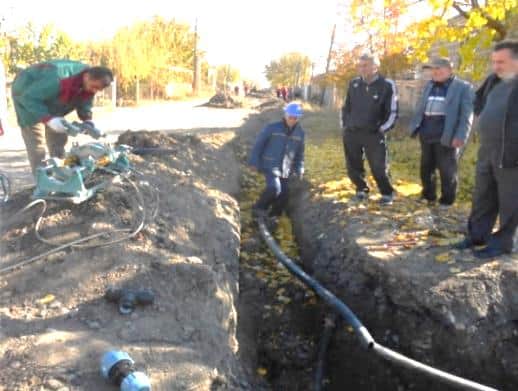
Local Projects Build Capacity for Energy Efficiency in Armenia
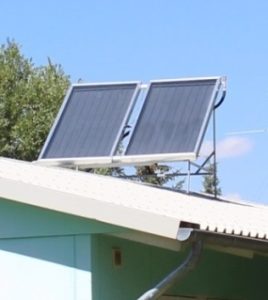 The ME&A managed Clean Energy and Water Program (CEWP) boasts 15 completed or ongoing projects throughout Armenia under this USAID funded program. CEWP is committed to build local capacity in energy efficiency by implementing demonstration projects and facilitating a wider application of energy efficiency technologies in Armenia. Through its projects, CEWP demonstrates application of innovative and efficient technologies to energy services and water supply in the rural communities of Armenia and encourages their further replication.
The ME&A managed Clean Energy and Water Program (CEWP) boasts 15 completed or ongoing projects throughout Armenia under this USAID funded program. CEWP is committed to build local capacity in energy efficiency by implementing demonstration projects and facilitating a wider application of energy efficiency technologies in Armenia. Through its projects, CEWP demonstrates application of innovative and efficient technologies to energy services and water supply in the rural communities of Armenia and encourages their further replication.
Many of these projects have already demonstrated success in improving energy efficiency indicators in the beneficiary communities. In the communities where CEWP renovates water networks, energy efficiency is achieved by reducing the load on water pumps due to decreased water losses. For example, average monthly electricity consumption indicators dropped from 5,500 to 4,100 kWh in Mrgashat village. A nearly 60% energy saving was recorded in Arteni village after replacement of water pipes. The project is still in its mid-phase and this indicator will tend to grow once the water meters are installed in individual households and water users develop more responsible water consumption patterns.
Soon after the solar water heating system came on-line in SOS Children’s
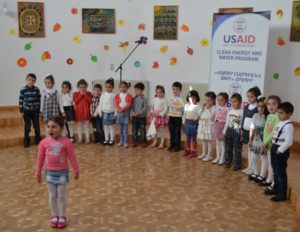
Village in Kotayk, inspectors from the local electrical utility visited the orphanage to investigate the electrical consumption data being generated by the electric meters. Given that the energy bills of the orphanage dropped substantially, as compared to previous data on energy consumption, the electrical utility suspected that the orphanage had begun cheating on its electrical consumption. After the orphanage administration demonstrated the solar collectors on the roofs of the cottages, inspectors quickly understood that the reason for reduced electricity consumption was, in fact, increased energy efficiency and not manipulation of the meters. By initial estimates, the solar collectors will generate a savings of about US$4,000 annually. These funds may then be used to meet other needs of the 49 vulnerable children living at the SOS Children’s Village. An outdoor lighting project implemented in another SOS Children’s Village in Ijevan will generate an estimated 85% energy savings due to replacement of existing lamps with more energy efficient LED lamps which consume less energy and have a longer life cycle.
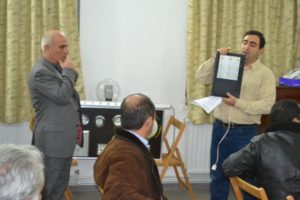 When the projects are completed, the CEWP tema organizes workshops and community outreach events to demonstrate successful results to representatives of other communities, regional authorities, local SMEs and other institutions that may be interested in improving energy efficiency in their communities and organizations. Similar workshops and events have been conducted in Ijevan town, Lernagog, Mrgashat, Darbas and SOS Kotayk villages.
When the projects are completed, the CEWP tema organizes workshops and community outreach events to demonstrate successful results to representatives of other communities, regional authorities, local SMEs and other institutions that may be interested in improving energy efficiency in their communities and organizations. Similar workshops and events have been conducted in Ijevan town, Lernagog, Mrgashat, Darbas and SOS Kotayk villages.
On December 5, the CEWP team conducted a community outreach event 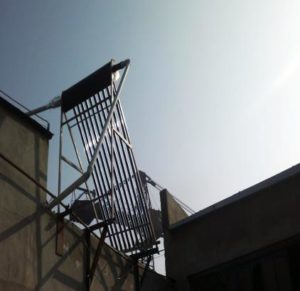 in Tatul village where the project sponsored a micro-exhibition of producers and suppliers of small-scale energy efficiency equipment such as solar air heaters, solar water heaters, radiant heaters, and LED lights which can be effectively applied in local communities at medium to low cost. Solar air heaters are produced by a small local firm, Ar Profectus LLC, which developed the idea of solar air heating with technical support from CEWP engineers. Specialists from CEWP helped Ar Profectus to improve and market the system. Similar consultations are provided to various organizations interested in implementing energy efficiency projects on an ongoing basis.
in Tatul village where the project sponsored a micro-exhibition of producers and suppliers of small-scale energy efficiency equipment such as solar air heaters, solar water heaters, radiant heaters, and LED lights which can be effectively applied in local communities at medium to low cost. Solar air heaters are produced by a small local firm, Ar Profectus LLC, which developed the idea of solar air heating with technical support from CEWP engineers. Specialists from CEWP helped Ar Profectus to improve and market the system. Similar consultations are provided to various organizations interested in implementing energy efficiency projects on an ongoing basis.
The Clean Energy and Water Program (CEWP) is funded through USAID’s Water II IQC. To learn more please visit www.cew.am and follow CEWP on Facebook.


